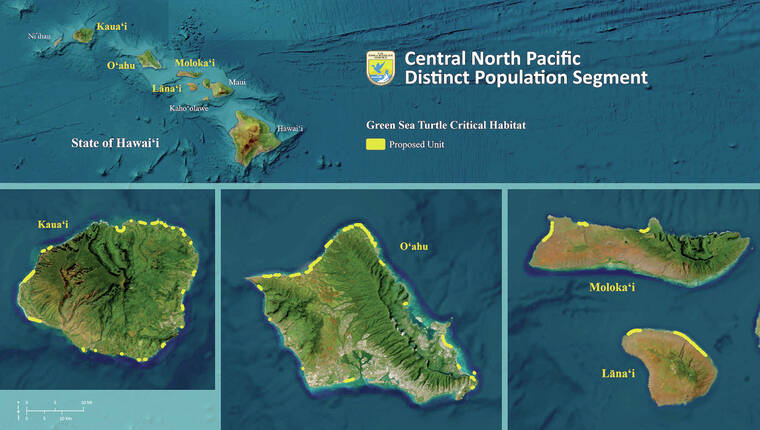LIHU‘E — In an effort to protect the endangered honu (green sea turtle), the U.S. Fish and Wildlife Service (USFWS) and National Oceanic and Atmospheric Administration (NOAA) announced Tuesday a proposal to designate over 8,500 acres of beaches and nearly 428,000 square miles of coastal waters as protected critical habitat.
“I’m relieved that green sea turtles are on their way to getting the habitat protection they need,” said Elise Bennett, Florida and Caribbean director at the Center for Biological Diversity. “These graceful marine turtles have come a long way, but healthy habitats will be key to their survival.”
For Pacific honu, the proposed protections would encompass approximately 2,233 acres of nesting and basking beaches along the main Hawaiian Islands, as well as 95 acres in the northwestern Hawaiian Islands and 546 acres across American Samoa, Guam and the Northern Mariana Islands. Protections would also expand to marine habitat in the islands’ nearshore waters.
For Atlantic honu, critical habitats would be implemented along approximately 5,725 acres of nesting beaches in Florida, where honu nesting activity in the U.S. is greatest. A total of 250 acres in Puerto Rico and 117 acres in Vieques and the U.S. Virgin Islands would also be included as critical habitat.
Additionally, nearshore waters up to 20 meters deep around all of Florida and parts of Puerto Rico and the U.S. Virgin Islands would be treated as marine critical habitat.
“Designating critical habitat for green sea turtles will help us effectively carry out our mission of protecting and recovering the species,” said Shannon Estenoz, assistant secretary of the Interior for fish and wildlife and parks. “Endangered Species Act protections are benefiting the species by raising awareness about its threats, inspiring diverse partnerships on its behalf, and now helping conserve habitat critical to its conservation and recovery.”
The proposed habitat protections follow a 2020 federal lawsuit in which three environmental organizations — the Center for Biological Diversity, Sea Turtle Oversight Protection and Turtle Island Restoration Network — claimed USFWS and NOAA were required to provide greater honu habitat protections under the Endangered Species Act.
Historically threatened by hunters, honu today face an array of risks. Coastal development has long impacted nesting beaches, as hatchlings often migrate toward artificial lighting and away from the ocean. Fisheries bycatch, vessel strikes, marine debris and pollutants also continue to impact honu populations.
Additionally, climate change has increasingly threatened honu. Rising seas and storms erode beaches and flood nests, higher sand temperatures can increase the number of female hatchlings, and changes in ocean temperature affect the amount and distribution of food, upsetting their migration, foraging range and nesting seasons.
“I’m hopeful protected habitat will help give green sea turtles a bright future,” said Maxx Phillips, Hawai‘i director and staff attorney at the Center for Biological Diversity. “The turtle’s fragile nesting grounds need to be treated with care if the species is going to survive. In a warming climate, we don’t have any time to lose. Federal habitat protection for the turtle is overdue, but I’m glad it’s coming soon.”
For more information on the critical habitat proposal, visit www.fws.gov/project/green-sea-turtle-critical-habitat-pacific-islands.
•••
Jackson Healy, reporter, can be reached at 808-647-4966 or jhealy@thegardenisland.com.







Tourists are one of the biggest threats to the Honu. Just yesterday I caught a little girl trying to climb on the back of one trying to surface for air and holding it underwater while her father was amused by the whole situation. I yelled over to them to back off, that the turtles were surfacing for air and that they should not interfere with them. The father looked a little sheepish once I said something and backed off. A few minutes later a couple of teenagers tried to grab other surfacing turtles. I hung there for a while with a windsurfer who was also trying to get them to back off and give the turtles some space. It appears that the HTA education program is really making a difference (sarcasm). Something really needs to be done to protect these fine animals from these people other than residents who happen to spot this behavior.